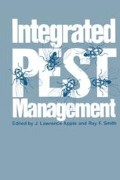Abstract
Pest management is concerned with the suppression of pests and with the alleviation of pest problems. The concept of a “pest” has meaning only in a human context: a pest is an organism that man regards as harmful to his person, property, or environment. As Rudd (1971) has observed, the word “pest” (like the word “weed”) is defined only according to its impact, direct or indirect, upon man, often in environments that man himself has modified considerably. Man makes an organism a pest as soon as he requires something it needs and which he is not prepared to share with it; and he frequently makes it a “worse” pest by manufacturing an environment that favors its increase and survival. Since pests, by definition, are competitors for resources that man wishes to preempt for his own use, the more resources he tries to preempt, the more pests he will encounter. Thus a study of pest management in ecological perspective must take account of the activities of man—the species that creates and aggravates pest problems and that devises treatment designed to alleviate them.
The Parable of the Beans and the Bean-Eaters Suppose you try to make a very simple system—a field, for example, in which you have killed everything in order to grow just one kind of living thing, say beans.… You will find that all sorts of plants and animals—mainly fungi and insects—try to come (to) eat your beans. M. Strong (1973)
Access this chapter
Tax calculation will be finalised at checkout
Purchases are for personal use only
Preview
Unable to display preview. Download preview PDF.
Literature Cited
Barlowe, R., 1972, Land Resource Economics (2nd ed.), Prentice-Hall, Englewood Cliffs, N.J.
Barnes, H. F., 1970, The biology of pre-neolithic man, in: The Impact of Civilization on the Biology of Man (S. V. Boyden, ed.), University of Toronto Press, pp. 1–18.
Boulding, K. E., 1971, Environment and economics, in: Environment, Resources, Pollution and Society (W. W. Murdoch, ed.), Sinauer Associates, Stamford, pp. 359–367.
Brown, L. R., 1967, The world outlook for conventional agriculture, Science 158:604–611.
Cabell, J. B., 1926, The Silver Stallion. McBride, New York (quoted by Hubbert, 1969).
Caldwėll, L. K., 1972, An ecological approach to international development: Problems of policy and administration, in: The Careless Technology (M. T. Farvar and J. P. Milton, eds.), Natural History Press, New York, pp. 927–947.
Clark, L. R., Geier, P. W., Hughes, R. D., and Morris, R. F., 1967, The Ecology of Insect Populations in Theory and Practice, Methuen, London.
Corbet, P. S., 1973, Application, feasibility, and prospects of integrated control, in: Insects: Studies in Population Management, (P. W. Geier, L. R. Clark, D. J. Anderson, and H. A. Nix, eds.), Ecological Society of Australia (Memoirs 1), Canberra, pp. 185–195.
Halstead, L. B., 1968, The Pattern of Vertebrate Evolution, Freeman, San Francisco.
Hardin, G., 1968, The tragedy of the commons, Science 162:1243–1248.
Hubbert, M. K., 1969, Energy resources, in: Resources and Man (P. Cloud, ed.), Freeman, San Francisco, pp. 157–242.
Leopold, A., 1949, A Sand County Almanac, Oxford University Press, New York.
MacArthur, R. H., and Wilson, E. O., 1967, The Theory of Island Biogeography, Princeton University Press.
McHarg, I., 1968, Values, process and form, in: The Fitness of Man’s Environment, Smithsonian Institution Press, Washington, D.C., pp. 209–227.
McHarg, I., 1969, Design with Nature, Natural History Press, New York.
Mead, M., 1970, The changing significance of food, Am. Sci. 58:176–181.
Robin, E. D., 1973, The evolutionary advantages of being stupid, Persps. Biol. Med. 16:369–380.
Rudd, R. L., 1971, Pesticides, in: Environment, Resources, Pollution and Society (W. W. Murdoch, ed.), Sinauer Associates, Stamford, pp. 279–301.
Smith, J. M., 1952, Struthiomimus, or the danger of being too clever (quoted by Halstead, 1968).
Southwood, T. R. E., 1972, The environmental complaint—Its cause, prognosis and treatment, Biologist 19:85–94.
Strong, M., 1973, Ecologists vs. modern agriculture, World Agr. 22:35–40.
Washburn, S. L., and Lancaster, C. S., 1968, The evolution of hunting, in: Man the Hunter (R. B. Lee and I. DeVore, eds.), Aldine, Chicago, pp. 293–303.
Watt, K. E. F., 1973, Principles of Environmental Science, McGraw-Hill, New York.
Wylie, P., 1968, The Magic Animal, Doubleday, Garden City, N.Y.
Author information
Authors and Affiliations
Editor information
Editors and Affiliations
Rights and permissions
Copyright information
© 1976 Plenum Press, New York
About this chapter
Cite this chapter
Corbet, P.S. (1976). Pest Management in Ecological Perspective. In: Apple, J.L., Smith, R.F. (eds) Integrated Pest Management. Springer, Boston, MA. https://doi.org/10.1007/978-1-4615-7269-5_5
Download citation
DOI: https://doi.org/10.1007/978-1-4615-7269-5_5
Publisher Name: Springer, Boston, MA
Print ISBN: 978-1-4615-7271-8
Online ISBN: 978-1-4615-7269-5
eBook Packages: Springer Book Archive

